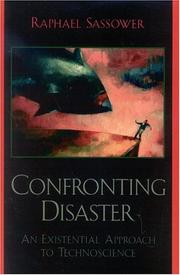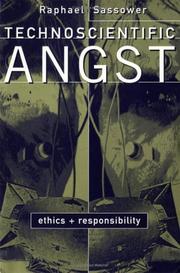| Listing 1 - 10 of 18 | << page >> |
Sort by
|

ISBN: 0739108514 0739108506 Year: 2004 Publisher: Lanham ; Boulder ; New York Lexington Books
Abstract | Keywords | Export | Availability | Bookmark
 Loading...
Loading...Choose an application
- Reference Manager
- EndNote
- RefWorks (Direct export to RefWorks)
Technology --- Technology and civilization. --- Science --- Science and civilization. --- Technologie --- Technologie et civilisation --- Sciences --- Sciences et civilisation --- Social aspects. --- Aspect social

ISBN: 0791414817 0791414825 Year: 1993 Publisher: Albany : State University of New York Press,
Abstract | Keywords | Export | Availability | Bookmark
 Loading...
Loading...Choose an application
- Reference Manager
- EndNote
- RefWorks (Direct export to RefWorks)
Knowledge, Sociology of --- Knowledge, Theory of --- Expertise --- Social sciences --- Sociologie de la connaissance --- Théorie de la connaissance --- Savoir-faire --- Sciences sociales --- Psychological aspects --- Methodology --- Aspect psychologique --- Méthodologie --- Knowledge, Sociology of. --- Expertise. --- Psychological aspects. --- Methodology. --- Théorie de la connaissance --- Méthodologie

ISBN: 0415911095 0415911109 Year: 1995 Publisher: New York : Routledge,
Abstract | Keywords | Export | Availability | Bookmark
 Loading...
Loading...Choose an application
- Reference Manager
- EndNote
- RefWorks (Direct export to RefWorks)
Technology --- Science --- Postmodernism --- Technologie --- Sciences --- Postmodernisme --- Social aspects. --- Philosophy --- History --- Aspect social --- Philosophie --- Histoire
Book
ISBN: 3030605736 3030605728 Year: 2020 Publisher: Cham, Switzerland : Palgrave Macmillan,
Abstract | Keywords | Export | Availability | Bookmark
 Loading...
Loading...Choose an application
- Reference Manager
- EndNote
- RefWorks (Direct export to RefWorks)
“Raphael Sassower’s timely reflection on the manifold complexity of hypocrisy could not be more necessary. His consideration of the implication of falsehoods across multiple registers of life is required reading.” —Michael E. Sawyer, Colorado College, USA, and author of Black Minded: The Political Philosophy of Malcolm X (2020) “In our age of 'phony news' and of the 'post-factual’, Raphael Sassower's new intervention takes on the notion of hypocrisy to not only challenge the current political scene, but more importantly and with more long-lasting reverberations, to challenges the very borders of moral philosophy.” —Suzanne Stewart-Steinberg, Director of the Pembroke Center and Professor of Italian Studies and Comparative Literature, Brown University, USA “An intellectual celebration. Sassower’s mastery and depth of research into psychological, psychoanalytic, social, moral, philosophical, and religious theories of hypocrisy is breath-taking. The book is a must-read.” —Nathaniel Laor, Professor Emeritus of Psychiatry and Philosophy, Tel Aviv University, Israel, and Clinical Professor in the Child Study Center, Yale University, USA Raphael Sassower examines the concept of hypocrisy for its strategic potential as a means of personal protection and social cohesion. Given the contemporary context of post-truth, the examination of degrees or kinds of hypocrisy moves from the Greek etymology of masks worn on the theater stage to the Hebrew etymology of the color adjustment of chameleons to their environment. Canonical presuppositions about the uniformity of the mind and the relation between intention and behavior that warrant the charge of hypocrisy are critically reconsidered in order to appreciate both inherent inconsistencies in personal conduct and the different contexts where the hypocrisy appears. Sassower considers the limits of analytic moral and political discourses that at times overlook the conditions under which putative hypocritical behavior is existentially required and where compromises yield positive results. When used among friends, the charge of hypocrisy is a useful tool with which to build trust and communities.
Sociology. --- Culture. --- Social psychology. --- Philosophy and social sciences. --- Political philosophy. --- Sociological Theory. --- Sociology of Culture. --- Psychosocial Studies. --- Philosophy of the Social Sciences. --- Political Philosophy. --- Political philosophy --- Social sciences and philosophy --- Social sciences --- Mass psychology --- Psychology, Social --- Human ecology --- Psychology --- Social groups --- Sociology --- Cultural sociology --- Culture --- Sociology of culture --- Civilization --- Popular culture --- Social theory --- Social aspects --- Hypocrisy. --- Truthfulness and falsehood
Book
ISBN: 1280659319 9786613636249 0739170228 9780739170229 9780739170205 0739170201 9780739170212 073917021X Year: 2012 Publisher: Lanham, Md. : Lexington Books,
Abstract | Keywords | Export | Availability | Bookmark
 Loading...
Loading...Choose an application
- Reference Manager
- EndNote
- RefWorks (Direct export to RefWorks)
Solo: Postmodern Explorations provides a postmodern approach to technoscience and economics. Sassower pulls together postmodern motifs and attitudes with his own experience to provide a unique perspective on political history and economics. Solo raises the question of whether it is possible to be an objective observer and what that means for scholarship, especially when it concerns making assessments of other cultures in the developing world. Sassower questions the usefulness of a
Civilization, Modern -- 21st century -- Philosophy. --- Economics -- Philosophy. --- Political science -- Philosophy. --- Postmodernism. --- Technology -- Philosophy. --- Civilization, Modern --- Economics --- Political science --- Technology --- Philosophy.

ISBN: 0847698432 Year: 2000 Publisher: Lanham (Md.) : Rowman and Littlefield,
Abstract | Keywords | Export | Availability | Bookmark
 Loading...
Loading...Choose an application
- Reference Manager
- EndNote
- RefWorks (Direct export to RefWorks)
Education, Higher --- Education, Higher --- Education, Higher --- University autonomy --- Aims and objectives --- Economic aspects --- Social aspects
Digital
ISBN: 9783030605735 9783030605759 Year: 2020 Publisher: Cham Palgrave Macmillan
Abstract | Keywords | Export | Availability | Bookmark
 Loading...
Loading...Choose an application
- Reference Manager
- EndNote
- RefWorks (Direct export to RefWorks)
“Raphael Sassower’s timely reflection on the manifold complexity of hypocrisy could not be more necessary. His consideration of the implication of falsehoods across multiple registers of life is required reading.” —Michael E. Sawyer, Colorado College, USA, and author of Black Minded: The Political Philosophy of Malcolm X (2020) “In our age of 'phony news' and of the 'post-factual’, Raphael Sassower's new intervention takes on the notion of hypocrisy to not only challenge the current political scene, but more importantly and with more long-lasting reverberations, to challenges the very borders of moral philosophy.” —Suzanne Stewart-Steinberg, Director of the Pembroke Center and Professor of Italian Studies and Comparative Literature, Brown University, USA “An intellectual celebration. Sassower’s mastery and depth of research into psychological, psychoanalytic, social, moral, philosophical, and religious theories of hypocrisy is breath-taking. The book is a must-read.” —Nathaniel Laor, Professor Emeritus of Psychiatry and Philosophy, Tel Aviv University, Israel, and Clinical Professor in the Child Study Center, Yale University, USA Raphael Sassower examines the concept of hypocrisy for its strategic potential as a means of personal protection and social cohesion. Given the contemporary context of post-truth, the examination of degrees or kinds of hypocrisy moves from the Greek etymology of masks worn on the theater stage to the Hebrew etymology of the color adjustment of chameleons to their environment. Canonical presuppositions about the uniformity of the mind and the relation between intention and behavior that warrant the charge of hypocrisy are critically reconsidered in order to appreciate both inherent inconsistencies in personal conduct and the different contexts where the hypocrisy appears. Sassower considers the limits of analytic moral and political discourses that at times overlook the conditions under which putative hypocritical behavior is existentially required and where compromises yield positive results. When used among friends, the charge of hypocrisy is a useful tool with which to build trust and communities.
Philosophy --- Philosophy and psychology of culture --- Political philosophy. Social philosophy --- General ethics --- Social psychology --- Sociology --- psychologie --- sociologie --- cultuur --- politieke filosofie --- sociale filosofie

ISBN: 0816629560 0816629579 Year: 1997 Publisher: Minneapolis : University of Minnesota Press,
Abstract | Keywords | Export | Availability | Bookmark
 Loading...
Loading...Choose an application
- Reference Manager
- EndNote
- RefWorks (Direct export to RefWorks)
Technology --- Technology --- Science --- Science --- Technologie --- Technologie --- Sciences --- Sciences --- Philosophy --- Moral and ethical aspects --- Philosophy --- Moral and ethical aspects --- Philosophie --- Aspect moral --- Philosophie --- Aspect moral
Book
ISBN: 1317493729 1317493737 1315712032 1282943308 9786612943300 184465379X 9781844653799 9781317493730 1844650669 9781844650668 9781315712031 9781282943308 6612943300 9781317493723 1844650669 9781844650668 1844650677 9781844650675 Year: 2006 Publisher: Durham : Acumen Publishing,
Abstract | Keywords | Export | Availability | Bookmark
 Loading...
Loading...Choose an application
- Reference Manager
- EndNote
- RefWorks (Direct export to RefWorks)
Most commentators think of Karl Popper and his intellectual legacy primarily in terms of his philosophy of science, while some recall his political philosophy. In Popper's Legacy, Raphael Sassower foregrounds Popper's political and economic ideas and relates them to his methodology of science, showing along the way the ideological convictions they provide. The primacy of Popper's ideological convictions and the context that gave rise to them are used as a springboard to understanding his revolutionary impact on the late twentieth century and his continued influence today. Neither biographical nor scholarly in the traditional sense, Sassower's analysis is more a cultural critique that incorporates the relevant elements in Popper's life and writings and the circumstances under which some books and essays were rejected or well received. By examining Popper in the round, and in particular his moral and psychological insights, Popper's Legacy presents an account and evaluation of Popper's thought that both his critics and acolytes will find fascinating.
Philosophy and science. --- Popper, Karl R. --- Influence. --- Criticism and interpretation.
Book
Year: 2009 Publisher: Boulder Paradigm
Abstract | Keywords | Export | Availability | Bookmark
 Loading...
Loading...Choose an application
- Reference Manager
- EndNote
- RefWorks (Direct export to RefWorks)
| Listing 1 - 10 of 18 | << page >> |
Sort by
|

 Search
Search Feedback
Feedback About UniCat
About UniCat  Help
Help News
News